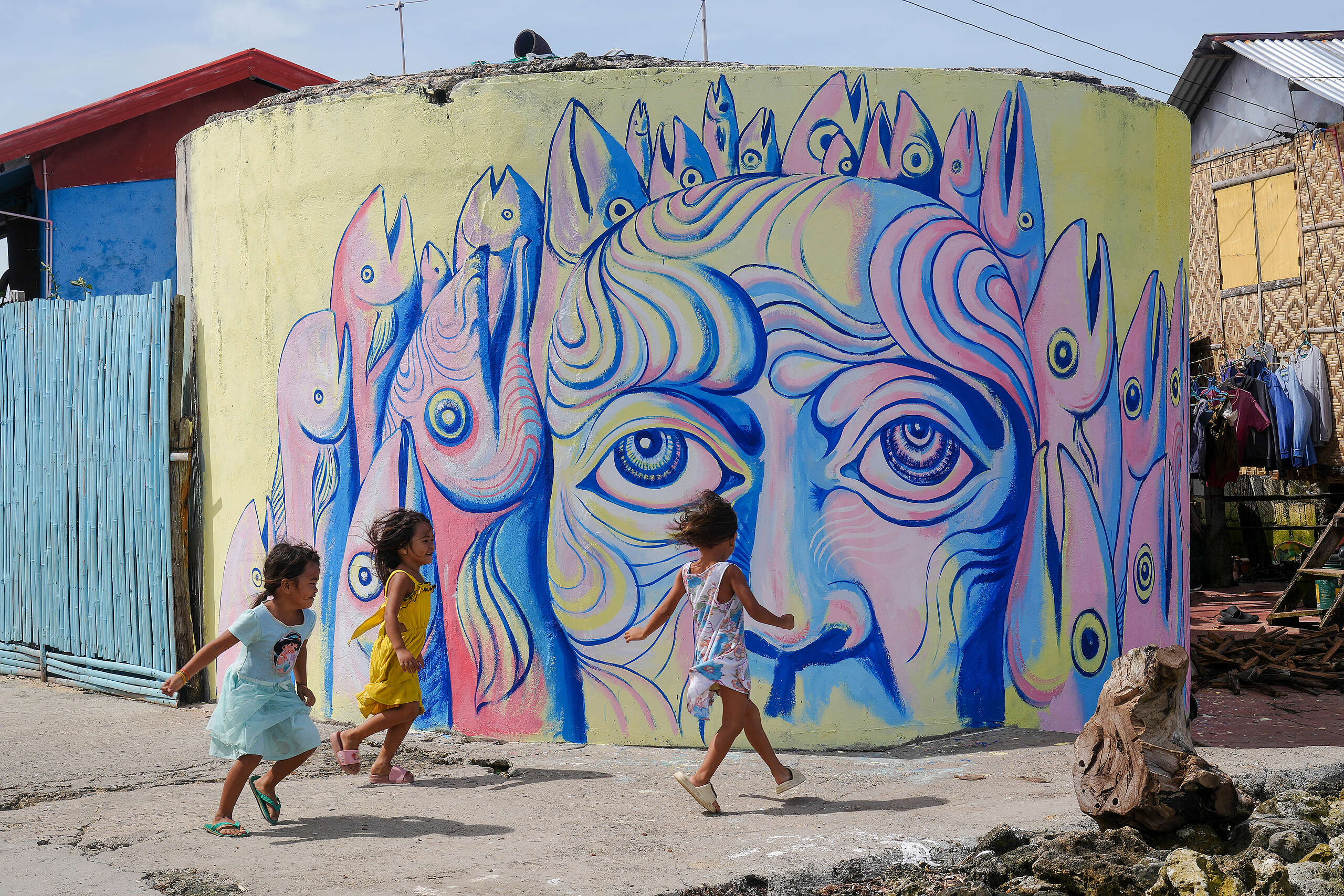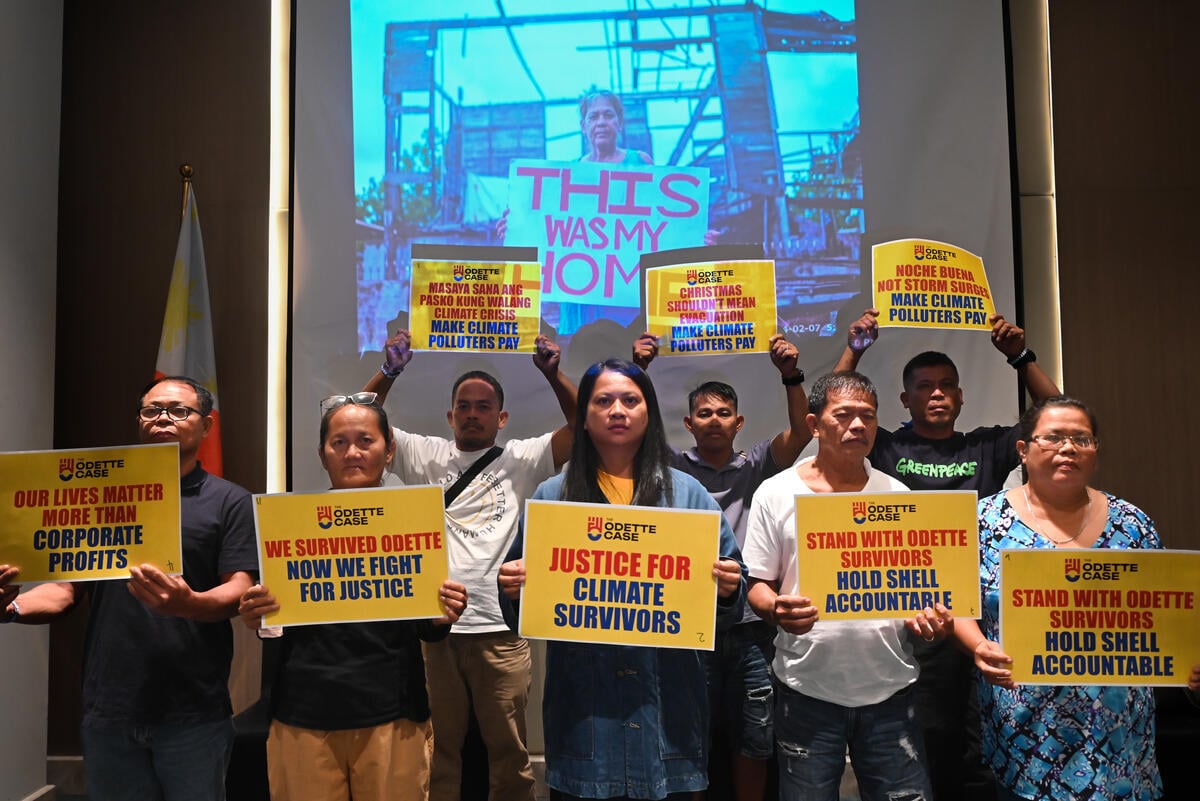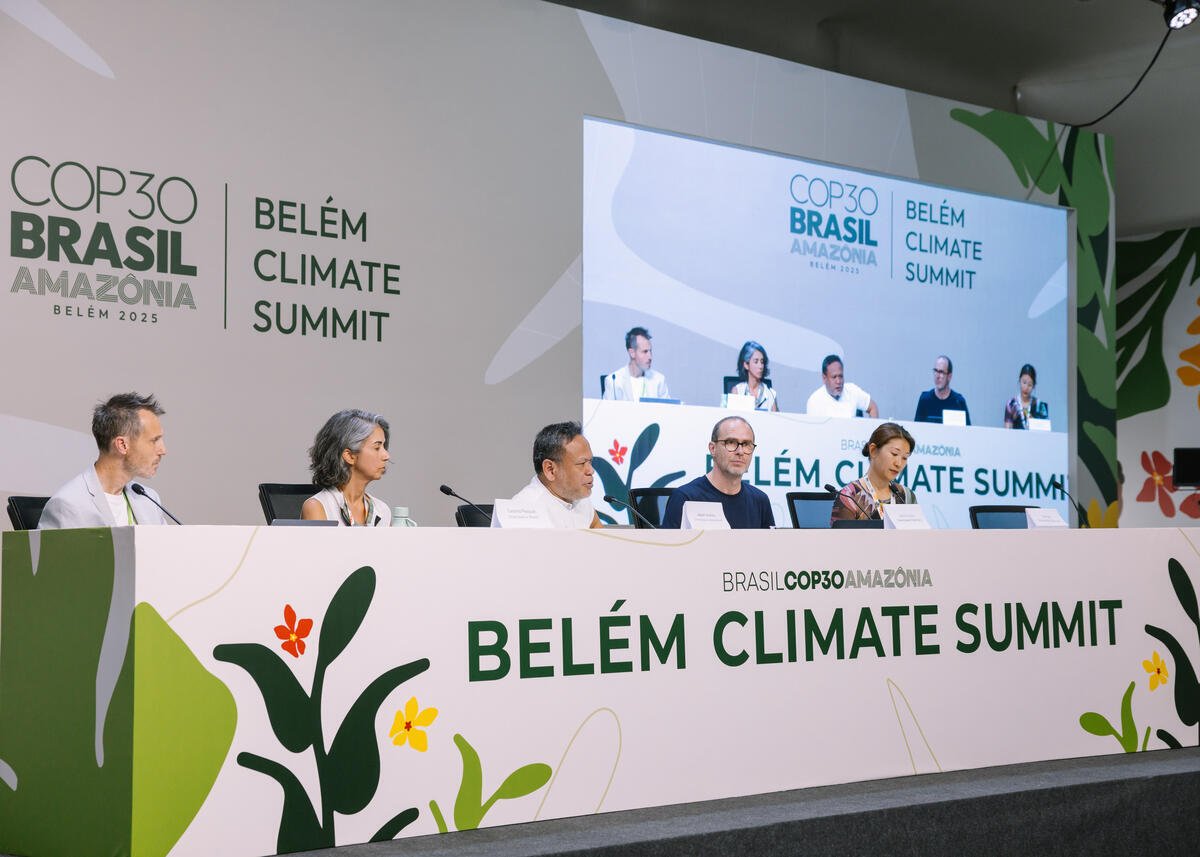QUEZON CITY, Philippines—Environmental and human rights groups today hailed a Dutch court ruling1 that declares Shell, one of the world’s biggest climate-polluting firms, is liable for damaging the climate. The groups said the decision is a huge win for Filipinos and other climate-impacted communities around the world as it orders Shell to radically change its business model throughout its whole supply chain.
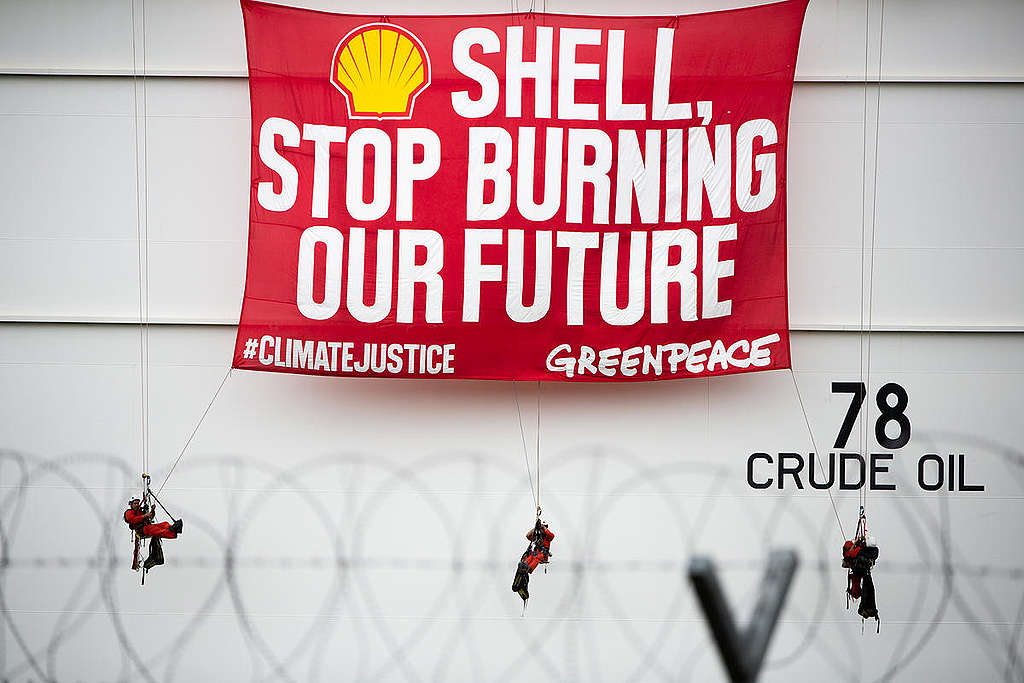
The Court ordered Shell to reduce its CO2 emissions by 45% in 2030 recognizing that companies, along with states, have the obligation to bring their operations in line with the science to address the human rights impacts of climate change. This ends the era of impunity of big climate polluting corporations.
“People around the world are winning the fight for climate justice. The findings provide a very strong basis not just for future legal actions against big polluters, but in reshaping climate policies and climate-destructive businesses. This will likely force the other big polluting firms to stop blocking the just transition to renewable energy,” environmental lawyer Atty. Grizelda Mayo-Anda said.
For Dr. Nymia Pimentel-Simbulan, executive director of PhilRights, the decision also reflects “the need to heighten our vigilance and collective action in the struggle for climate justice.”
Commenting on the ruling’s impacts on workers, Josua Mata of Sentro ng Nagkakaisa at Progresibong Manggagawa said: “It signals a massive shift in thinking about the legal culpability of transnational corporations. This is a clear warning that their days of dumping their pollution on all of us—which affects workers all over the world—will no longer go unpunished. However, we warn Shell against foisting on us false solutions like biofuels.”
Ian Rivera, national coordinator for Philippine Movement for Climate Justice, said: “PMCJ welcomes the decision of the Dutch Court. This may be long overdue but this is precedent-setting, and we all need this kind of action to help prevent climate catastrophe. Companies like Shell and other dirty companies destroying our climate must face the consequences.”
The groups also urged the Commission on Human Rights (CHR) to expedite the issuance of the resolution to the world’s first Climate Change and Human Rights Inquiry2, which looks into the responsibility of Shell and other investor-owned fossil fuel and cement companies for human rights harms arising from business practices that aggravate climate change.
Once released, the CHR Resolution can be used alongside the Dutch ruling as benchmarks to craft climate litigations against Shell and other carbon majors, such as Exxon, Total, and Chevron, in the Philippines and abroad. In an online event August 20203, CHR Commissioner Roberto Cadiz said the CHR “recognize[s] the importance of this resolution in terms of creating a landmark decision, which other courts and human rights institutions in and outside the country can rely on.”
“The Dutch court ruling brings us a step closer to attaining climate justice for Filipinos who are at the receiving end of injustices arising from decades of fossil fuel addiction. This is legal recognition that Shell and other carbon majors’ business model of continued extraction, production and burning of fossil fuels–and their denial of climate science–is costing us lives and livelihoods, and impinges on our most basic rights and dignities as human beings,” Greenpeace Campaigner Virginia Benosa-Llorin said. “Following this ruling, we hope to see the immediate release of the resolution to the CHR climate inquiry, which we believe will be another historic precedent that will help end reliance on fossil fuels.”
Von Hernandez, 2003 Goldman Environmental Prize recipient and a petitioner to the case, said: “We hope that the CHR will take this as a cue to release its long-awaited resolution on the role of fossil fuel companies in bringing about the climate crisis and establish their accountability for impinging on the rights of Filipinos, especially those who are most vulnerable to the grave and intensifying impacts of climate change. At a time when our people are already experiencing the escalating impacts of climate change, further inaction and delay on the part of the CHR effectively translate to condoning the human rights violations being committed on millions of Filipinos by the fossil fuel industry.”
EcoWaste Coalition National Coordinator Aileen Lucero echoed the need for the CHR to speed up the release of the resolution: “The landmark decision by the Dutch court ordering Shell to cut emissions should embolden the CHR to resolve the case filed against fossil fuel companies. We have waited long enough for the case to be resolved in favor of the Filipino people who are bearing the brunt of climate impacts on their lives and human rights.
Beckie Malay of the Philippine Rural Reconstruction Movement, said: “People power can force the big polluters to reduce their emissions. We hope that our community actions in the Philippines will have the same power to compel the carbon majors to act now before it’s too late. A favorable resolution of our CHR petition will also provide strong moral ground on which all human and environmental rights defenders can globally stand on.”
Notes to Editors:
[1] The case against Shell was brought by local environmental group Friends of the Earth the Netherlands (MilieuDefensie). The lawsuit is supported by 17,329 people. Greenpeace Netherlands, ActionAid, Both ENDS, Fossil Free NL, Jongeren Milieu Actief and the Waddenvereniging are also plaintiffs in the case. The plaintiffs sought to compel the company to align its business with the climate goals established in the Paris Agreement, based upon Book 6 Section 162 Dutch Civil Code (standard of care) and Articles 2 and 8 of the European Convention on Human Rights (concerning, respectively, the right to life and the right to private life, family life, home, and correspondence).
[2] Shell, BHP Billiton, BP, Chevron, ConocoPhillips, ENI, ExxonMobil, Glencore, OMV, Repsol, Sasol, Suncor, Total and RWE are among the 47 respondents of the world’s first-ever climate change and human rights petition. In the initial findings announced last December 2019, CHR Commissioner Roberto Cadiz said carbon majors could be found legally and morally liable for human rights harms to Filipinos resulting from climate change.
[3] August 5, 2020 | CHR eyes conclusion of case vs fossil fuel companies in August; Communities call for ‘climate justice,’ people-centered decisions
[4] Greenpeace Philippines, Ecowaste, PRRM, PMCJ, SENTRO, PhilRights, and Von Hernandez are among the petitioners to the Philippine Climate Change and Human Rights Inquiry. The petition, which was filed before the Commission on Human Rights, now awaits its final resolution. Read more.
Media contact:
Angeli Cantillana
Communications Campaigner, Greenpeace Southeast Asia – Philippines
[email protected] | +63 998 595 9733
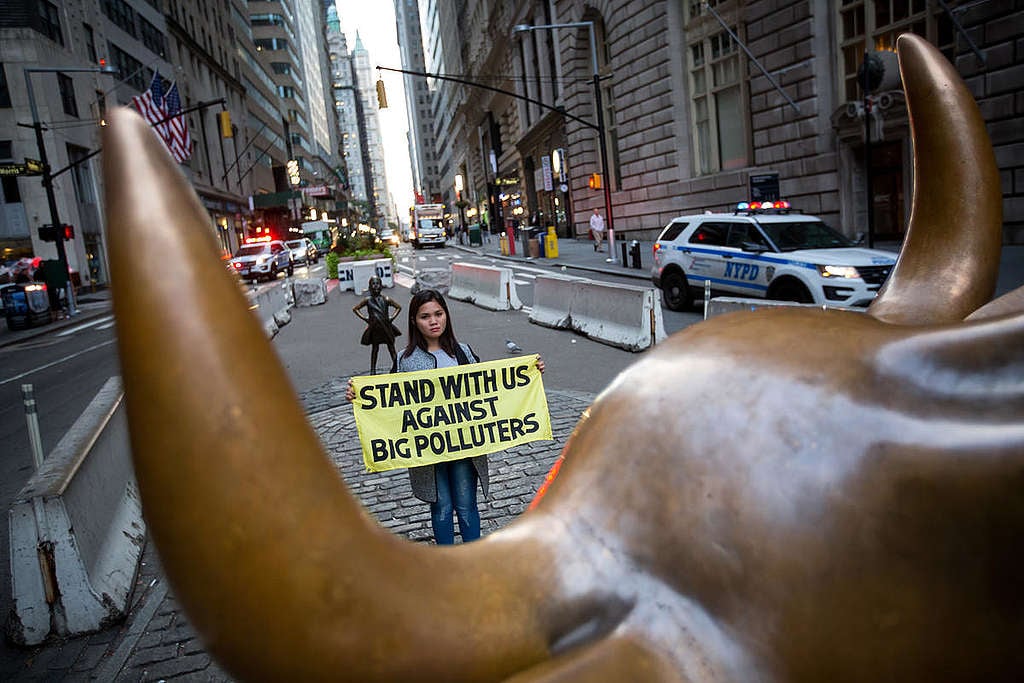
Filipinos are enduring the worst impacts of climate change, caused by greedy corporations. It’s time to hold them to account!
TAKE ACTION
